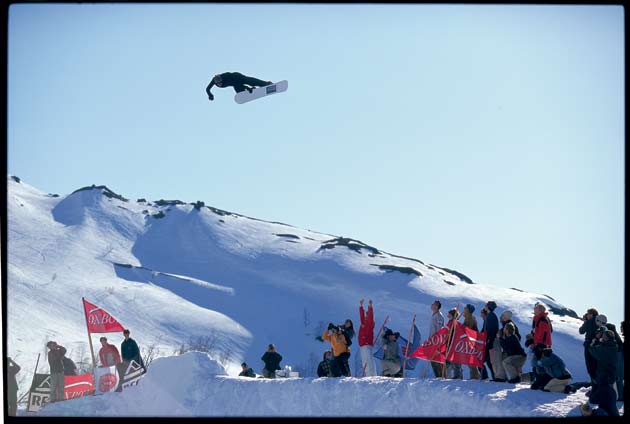Of Rails and Rice Paddies
A Season in Japan
Words: Sam Baldwin
Photography: Marcel Lammerhirt
Goggled, gloved and hooded, barley a square inch of skin was exposed as I surveyed the terrain from the lift. The snow was so deep that my board dragged on the surface at times on the ride up. All I could hear was the soothing sound of Japanese snowflakes falling on my hood, like rain on a tent. I watched two figures emerge from the whiteness, sweeping past in the thigh deep crystals, snow streaming from their bodies like a jet’s vapour trail, before they disappeared back into the mist. It was going to be a good day.

Japan is a mountainous nation that has long been known to the global powder hounds who come to the archipelago in search of deep snow, a fresh cultural experience and the chance to buy beer from a vending machine. The majority of foreign travellers head straight for the renowned ski meccas of Hokkaido and Nagano, both of which boast Olympic glory and are comparable in size to many premier European and North American resorts. I however, was to live and breathe in another, more secret and secluded corner of Japan.
Having heard tales of a crazy culture, warm-hearted people and insane powder, I decided to quit my job in England and head for the Far East, where I would pay my way by teaching my mother tongue and see this unique land through my own goggles. Even the best laid plans go awry, though, and to my initial dismay I somehow ended up in Ono, Fukui, (pronounced “FOO – KOO – E”) a small town in an area not known for its skiing, and a region considered inaka (a rural backwater) by most Japanese!
At first, I lamented my bad luck at winding up in such an undesirable location. Why did I have to stay here, when I could have been sampling Japan’s finest snowboarding zones? Little did I know that I was about to experience a winter of truly epic proportions.
Situated in Japan’s gosetsu chitai or ‘snow belt’, Fukui receives huge volumes of snow, (or yuki in Japanese) every winter. Indeed, the winter of 05/06 started early, with unusually heavy and prolonged periods of snowfall not seen in the country since 1981. Planes were delayed, trains were derailed… and a big smile was plastered on the faces of snowboarders across the nation. I’ve lived in B.C, Canada, I’ve ridden the mountains of Europe and I’ve seen what New Zealand has to offer, but never, ever, had I experienced the incredible, unbelievable, unforgettable volumes of snow I enjoyed in Japan. There were sheets of the stuff, falling so thick and fast that you couldn’t help inhaling flakes; huge snow banks that dwarfed cars; snow being loaded into dump trucks for disposal at the municipal “snow dump”; and everywhere such great volumes of yuki that houses were crushed under its very weight. As thunderous storms raged for eight days straight, trees were submerged and roads blanketed. The locals said it was like a winter of old, and it’s certainly likely to remain the heaviest winter I’ll ever have the pleasure of being part of.

Since Japan’s ski industry exploded in the early 90s, competition for paying customers has become cut-throat. There are over 500 ski areas in the country and little Fukui is not a big player on the scene. Foreign visitors and even most of the natives tend to head for the bigger, more famous and more fashionable resorts, leaving Fukui a forgotten land where locals rule. The result: untracked snow, one man powder days and deserted slopes.
Though many of Fukui’s ski areas consist of little more than a couple of chairlifts and a handful of short runs, these ‘micro resorts’ are kept well fed with natural snow and allow access to the densely treed mountains that characterise the area. I well remember my first night riding trip to the tiny area of Kadohara, a short 20 minute drive from my home. The snow was falling in a dense veil and I felt like some sort of artic explorer as I excitedly made my way up the weaving white roads, braving the storm when few others dared leave their homes.
Pulling into an empty car park, I found the floodlit slopes bathed in a strange green light. Puzzled by the lack of people, I bought a ticket and clambered aboard the rickety two man lift, which rumbled me to the top through the ever falling flakes. As a paused to strap on my board and select a line, I saw that not a single track was present. I set off through the deep, deep snow, greedily devouring the local delicacy, not wanting to waste a second of my time in this white heaven. Three lifties watched me from the cosy glow of their wooden huts, obediently dusting the snow from the lift and bowing to me each time I lapped them, but I was the sole night rider that evening. Everybody’s heard the expression ‘no friends on a powder day’, but this put a whole new slant on the phrase. Here I was, with snow falling so thick and fast my tracks were becoming covered almost as quickly as I could make them, yet it seemed no one else was willing to join me on that stormy January night.
These small, often family-run ski areas are typical of Fukui and indeed much of Japan, and can be found throughout the country, from the sub-tropical island of Kyushu in the south right up to sub-artic Hokkaido in the north. A far cry from the over crowded, over priced and often over hyped ‘super power’ resorts of the world, they make a quirky and quiet alternative to the mainstream snow zones. To say that the mountains in this secluded corner of Japan are without any claims to fame, however, would be an unfair claim. For instance Katsuyama Ski Jam, the biggest of the nine resorts in the area, decided to raise their profile by installing what was, at the time, thought to be the world’s longest rail. At 180ft (55m) this ball busting length of cold steel was certainly the biggest I’d ever heard of, and I enjoyed watching snowboarders and skiers alike attempting to slay the beast and claim the 55,000 yen prize money at the various rail jams throughout the season.

As my Japanese improved and I began to meet more of the locals, I stumbled upon the greatest find a snowboarder could hope for in a foreign land: a man who not only knew the local mountains better than any other, and was not only a well seasoned climber, but who also owned the best bar in town. 47 year old Ono local Yasu Matsuta enabled by far the most important part of my Japanese snow experience – the backcountry exploration of the Okuetsu and Hakusan ranges.
Our friendship, based on a mutual love of mountains, snow and music, quickly blossomed during the long winter nights over cups of nihonshu (rice wine), and his famous home smoked cheese. Somewhat of a legend in these parts, Yasu gained ‘man of the mountains’ status after summiting some of the Himalayas’ gnarliest peaks. His bar Yumeya, meaning ‘dream shop’ is a cosy hangout for local lovers of snow, and the walls are adorned in climbing paraphernalia; the ice pick, snowshoes, and pictures of sabre-toothed peaks are all proof of his past expeditions. It was at this rustic drinking den, moreover, that the Japanese first broke their shy stereotype. “What colour is your under hair?” and “Have you ever play sex?” are a couple of the more personal inquiries that have come my way during an evening at Yumeya, along with endless shots of free shouchu (a liquor distilled from rice/sugar cane) and offerings of dried, fried squid.
Owning a bar gave Yasu the freedom to climb and ski mountains, sometimes for days at a time, whenever the desire presented itself. Often, we would turn up at Yumeya ready for a night of drunken revelry, only to find the lights off and the door locked; Yasu was out hiking through snow on some remote Japanese peak again!

Though approaching 50, a smoker, and a self-confessed alcoholic, Yasu frequently put us young ‘healthy’ whippersnappers to shame by blazing ahead and reaching the summit well before the rest of us. Once at the top he would always fire up his camp stove and cook up a batch of his favorite local delicacy – ton-chan or cow intestines, in celebration of conquering the mighty mountain. Now I admit that this chewy tissue was never in my top ten of favorite dishes, but it always went down well after burning so many kilojoules on the way up, especially when, with a quick Campai! (‘Cheers!’), it was washed down with a can of Kirin Beer, Japan ‘s national brew.
So, if you ever get the chance to ride in the land of sumo and sushi, remember: Japan is a land of hidden snow gems. After two years in this backwater haven, I’m packing up and moving on, but would I have swapped my Fukui experience for a more famous and fashionable location? No way.
I leave Fukui loaded with a million images stored in my mind; a winter that broke records, a kindhearted people who welcomed me into their lives to share their food, language and culture, and a quiet, forgotten, snowy paradise that I will always remember.
Domo arigato gozaimasu, Fukui.
Sam Baldwin is the editor and owner of SnowSphere.com, the online travel magazine for snowboarders featuring out of the ordinary destinations from India to Iceland .

